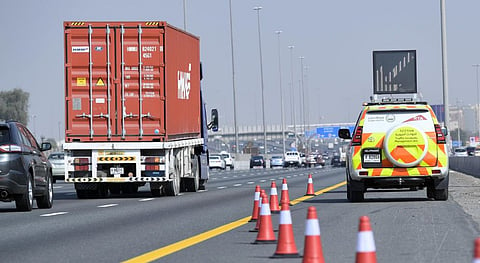More Dubai roads to see fast clearing of accident sites
RTA-Dubai Police rapid intervention project to add 15 roads in three years to the scheme

Dubai: Dubai’s Roads and Transport Authority (RTA), in collaboration with the General Headquarters of Dubai Police, has expanded the scope of the 'Traffic Incidents Management Initiative' to include 15 highways and key streets in Dubai extending 425km over the next three years, the authorities said on Sunday.
The step follows the huge success of the trial operation of the initiative, which contributed to reducing secondary injury-related accidents, improving traffic flow and considerably speeding up the clearance of vehicles affected by accidents in line with top international practices, RTA said.

First phase
The first phase of the project will start in the second half of this year. It covers seven streets, namely: Sheikh Zayed Road, Sheikh Rashid Street, Al Ittihad Road, Al Khail Road (first phase), Dubai-Al Ain Road, Al Yalayes Street, Sheikh Mohammed bin Zayed Road, Al Rabat Street, and the Airport Road.
Phase 2, which will start in 2023, covers four roads: Al Khail Road (second phase), Emirates Road, Jebel Ali-Lehbab Road and Sheikh Zayed bin Hamdan Al Nahyan Street.
The third phase, which will start in 2024, also covers four roads: Dubai-Hatta Road, Umm Suqeim Street, Expo Road, and Hessa Street.
The selection of roads was based on several criteria such as the intensity of traffic, especially during peak hours, and the high number of accidents and broken-down vehicles on the roads, said Al Tayer.
Rapid intervention
“We have identified several central points for positioning rapid intervention vehicles on highways and key roads to ensure the arrival of vehicles to the site of incidents on these roads within 10 minutes,” he added. He said the Traffic Incidents Management Unit would cater to the broken down vehicles and the rapid management of traffic incident sites.
“It will handle minor incidents that do not require the attendance of police officers, clear vehicles involved in accidents or broken down and restore traffic to normal. The unit will also assess the damage inflicted on the infrastructure as a result of incidents, compile reports, make traffic diversions at the incident site and the surrounding roads network, and assist road users. It will also support the Dubai Police during severe accidents, protect parked vehicles, and provide traffic support during events."
He concluded that the Traffic Incidents Management service will be of great benefit to motorists in Dubai in terms of safety and saving time by reducing the negative impact of the journey time caused by traffic incidents.
Strategic partnership

He added: "It will provide judicial support for the Traffic Incidents Management Unit, monitor traffic cameras, and undertake rescue operations during traffic accidents, among others. RTA will provide technical and financial support for the scheme and address the traffic diversions, the timing of traffic signals, electronic messaging signs, tactical traffic diversions, traffic monitoring and response plans, on-site camera monitoring, and prepare the infrastructure for test sites.”
Al Marri expressed his delight with this cooperation aimed at supporting the achievement of the strategic objectives of Dubai to become a safe, stable city in which the core development ingredients of preserving lives and properties are fully catered to.
Sign up for the Daily Briefing
Get the latest news and updates straight to your inbox


